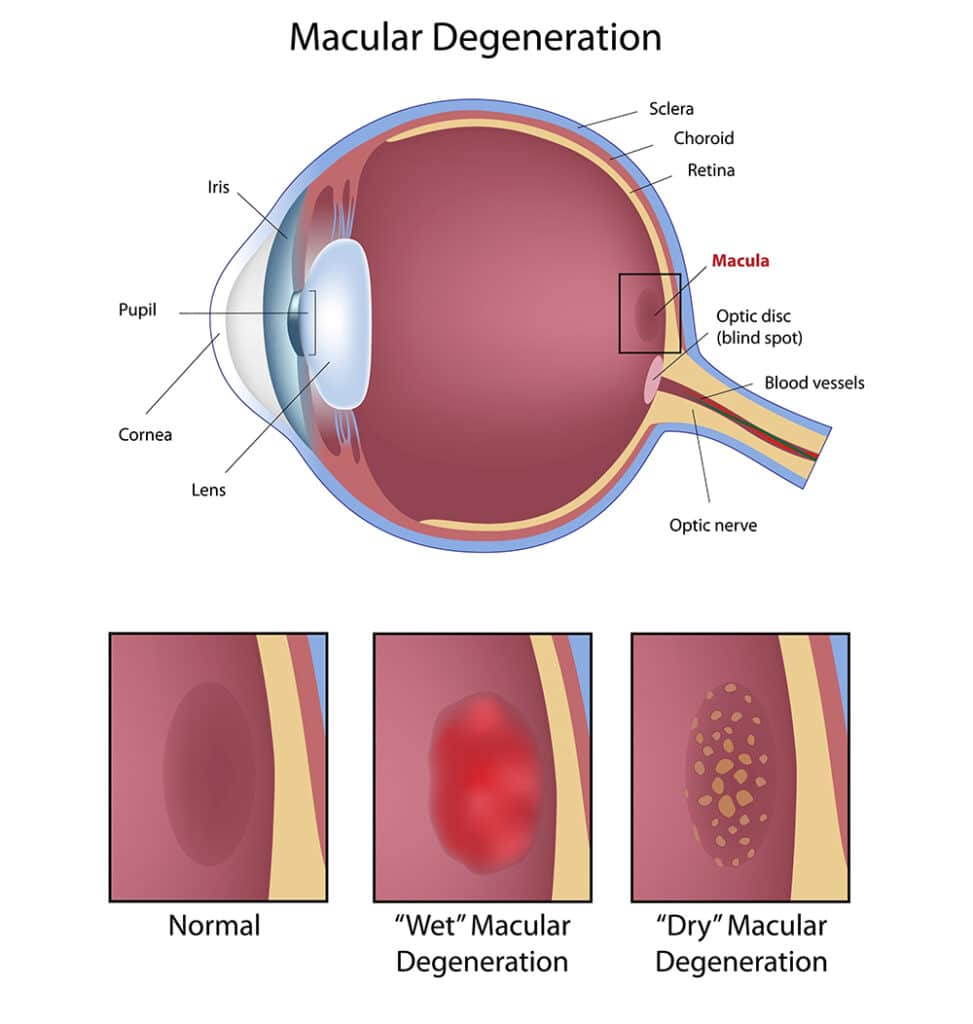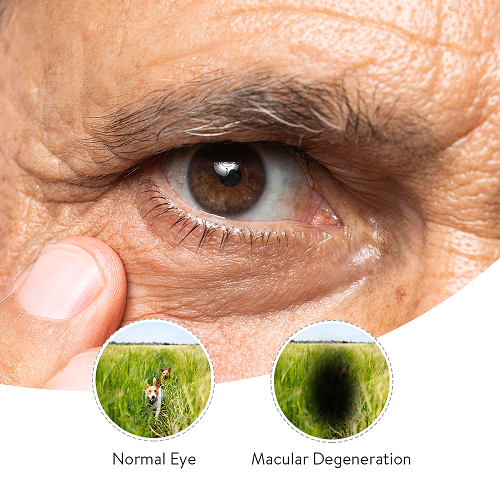Macular Degeneration
What is Macular Degeneration?
Macular degeneration refers to the damage and atrophy of the macula, leading to a decline in visual acuity without the loss of peripheral vision. Thus, images appear clear from the edges and blurred from the center, which may worsen over time. This deterioration is a primary cause of serious vision problems but does not lead to total blindness. This disorder is often attributed to aging, especially in individuals over fifty, and is termed age-related macular degeneration (AMD).
A less common form of macular degeneration known as Stargardt disease, or macular dystrophy, affects children and young adults.

Macular degeneration is categorized into two main types:
Dry (Atrophic) Type: The most prevalent, accounting for 80% to 90% of macular degeneration cases, with its causes yet to be precisely identified. This type progresses more slowly than the wet type. In age-related dry macular degeneration, small white or yellow deposits form under the retina in the macular region, leading to the damage and atrophy of light-sensitive nerve cells over time.
Wet Type: Affects about 10% to 15% of those with age-related macular degeneration but is responsible for approximately 90% of severe vision loss cases from the disease. Wet macular degeneration occurs when abnormal blood vessels and capillaries grow under the retina towards the macula. These new blood vessels are fragile and prone to bursting and bleeding, causing fluid leakage inside the retina.
The new blood vessels and resulting bleeding lead to scar formation, ultimately causing faster loss of central vision than the dry type.
Aging: Age-related macular degeneration is more common among the elderly and is the primary cause of severe vision loss in individuals over fifty.
Genetic Factors: If someone in the family has a history of macular degeneration, the likelihood of developing the disease increases.
Harmful Habits: Such as smoking and excessive consumption of cigarettes, tobacco, and alcoholic beverages.
Health Conditions: High blood pressure, high cholesterol levels, and obesity contribute to the risk.
Diet: Excessive consumption of foods high in saturated fats, fast foods, and sugary drinks.
Physical Characteristics: Females are more susceptible, as well as individuals with light skin and light-colored eyes.
Initially, there may be no clear signs of macular degeneration. However, as the disease progresses and central vision deteriorates, warning signs such as difficulties in reading, focusing while walking, or driving may emerge.
Other symptoms include black spots in the field of vision or color perception distortions.
These symptoms often start in one eye but tend to spread and affect the other eye as well. A patient may suffer from one or both types.
It’s important to consult a doctor for necessary diagnostic tests and damage assessment through fundus and retina examination, visual field mapping, and imaging of the blood vessels nourishing the retina and macula.
Regular visits to an ophthalmologist at least once a year after the age of fifty, or upon the onset of any symptoms, are advised as early detection can mitigate the severity of the disease.

Treatment of Age-Related Macular Degeneration
There is no cure for macular degeneration yet, but some treatments can slow the disease’s progression and significantly reduce vision loss.
Available treatment options include:
Anti-VEGF Medication: These drugs prevent the formation of new blood vessels and have shown positive results, with many patients regaining some of the lost vision. This treatment may require repeated sessions.
Laser Therapy: Uses a high-energy laser beam to destroy the abnormal blood vessels forming in the retina.
Photodynamic Laser Therapy: Involves the injection of a light-sensitive drug, such as Verteporfin (Visudyne), into the bloodstream, which is absorbed by the abnormal vessels, followed by laser activation of the drug to damage those vessels.
Assistive Devices and Lenses: These tools include specialized lenses or electronic systems to magnify images of close objects, helping those with vision loss due to macular degeneration make the best use of their remaining visual capabilities.
Adaptive treatment Can Age-Related Macular Degeneration be Prevented?
A comprehensive study showed that consuming supplements containing vitamins C and E, lutein, zeaxanthin, zinc, copper, and omega-3 may help alleviate symptoms of dry macular degeneration in some patients.
Quitting smoking, regular physical activity, a balanced and healthy diet, avoiding fast food, drinking plenty of water, and preventing obesity are effective measures to slow the disease’s progression.
It’s also essential to have annual doctor visits for thorough examinations to ensure the retina’s health and condition.
Working Hours
Saturday
7 pm to 9 pm
Sunday
7 pm to 9 pm
Monday
7 pm to 9 pm
Tuesday
7 pm to 9 pm
Wednesday
7 pm to 9 pm
Thursday
Closed
Friday
Closed
Ramadan Working Hours
Saturday to Wednesday from 9 pm to 11 pm
Location
21st Ismail Ramzy st. – El-Bostan – Heliopolis – 4th floor
01110114354
01222422637
0226331026
(7 pm to 9 pm)
Make Appointment
Always happy to receive your inquiries
